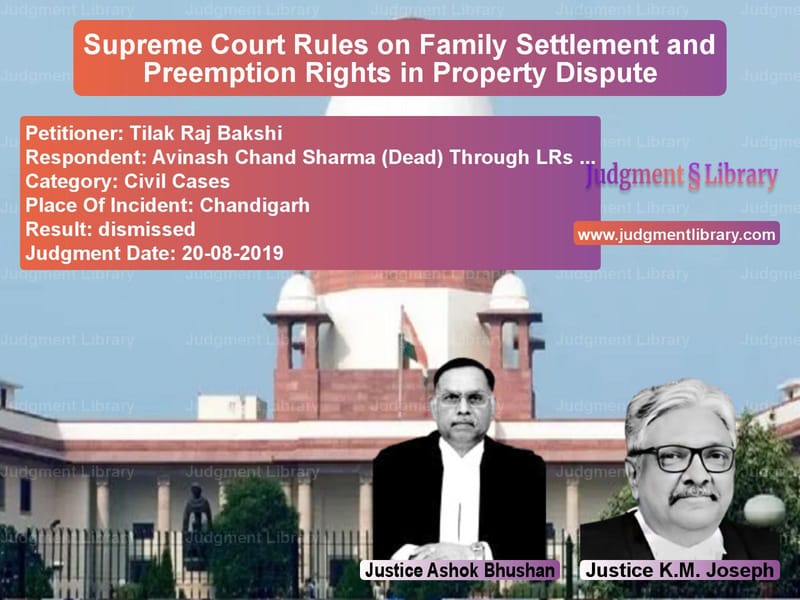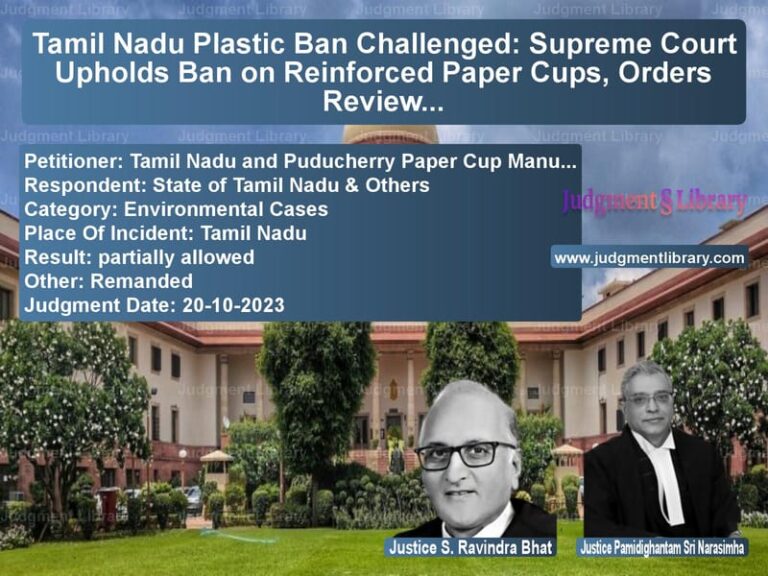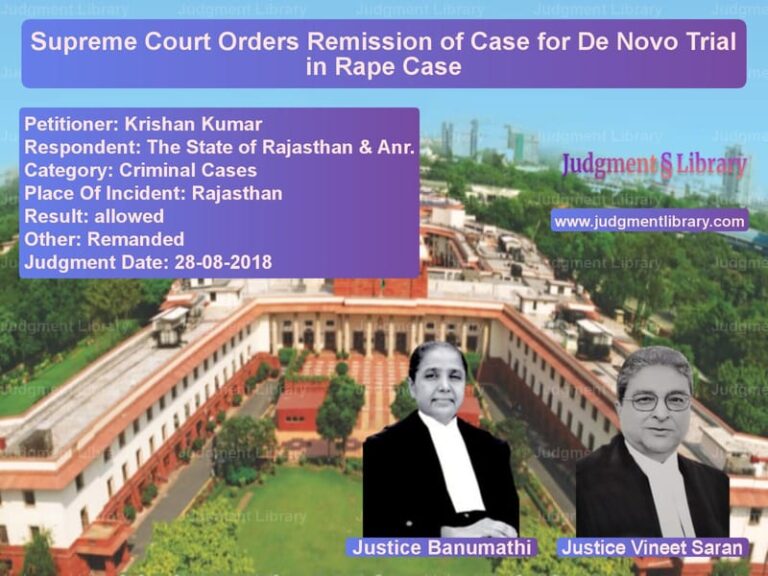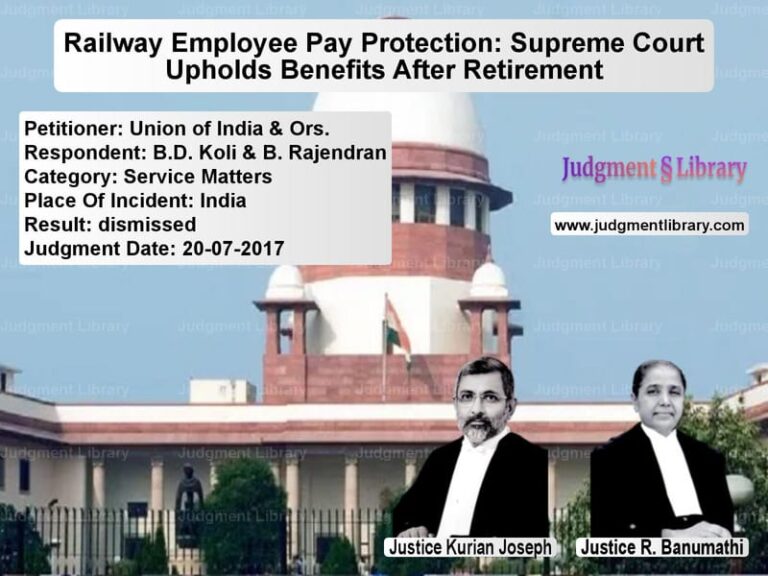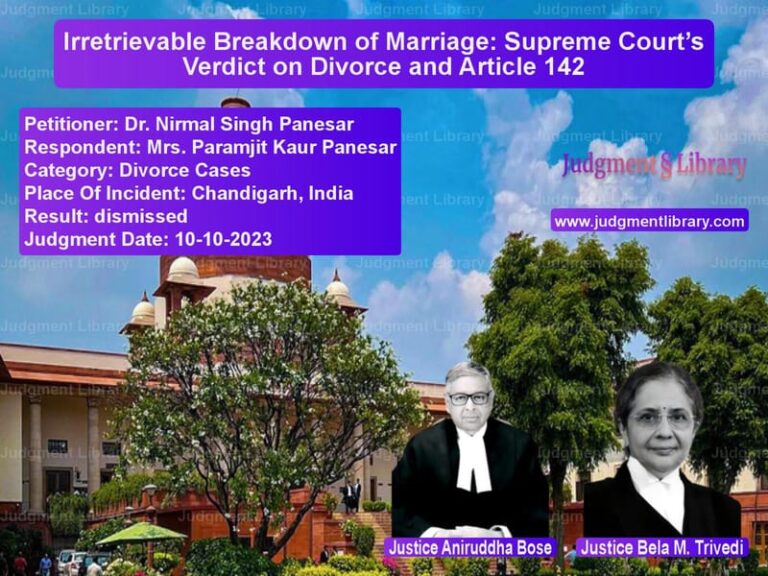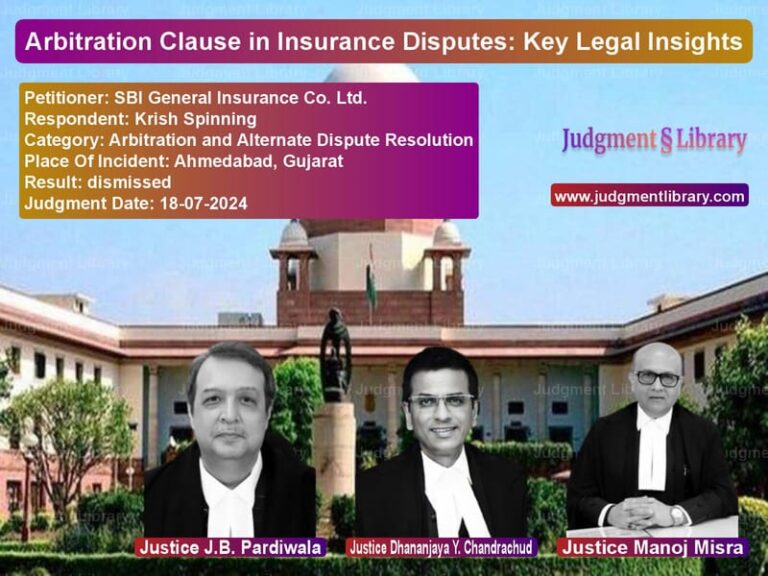Supreme Court Rules on Family Settlement and Preemption Rights in Property Dispute
The case of Tilak Raj Bakshi vs. Avinash Chand Sharma (Dead) Through LRs & Others revolved around a dispute concerning the sale of a family property in Chandigarh. The Supreme Court, in its judgment dated 20th August 2019, dealt with key legal issues regarding the validity of a family settlement, preemption rights of co-owners, and the applicability of fragmentation rules in property sales.
Background of the Case
The dispute originated from the ownership of a house in Chandigarh, which was owned by one Kirpa Ram Bakshi. He had executed a registered will on 4th September 1974, in favor of his three sons—Tilak Raj Bakshi (plaintiff), the first defendant, and another brother (third defendant). After the testator’s death, the property was transferred to the three brothers by the Estate Officer.
On 31st March 1982, the three brothers entered into a family settlement, which included the following key clause:
“The individual portions of New Delhi and Chandigarh and agricultural land cannot be sold without concurrence of all three in writing, and if it is sold on agreement of three, first preference to be given to both other brothers.”
The plaintiff alleged that his brother (first defendant) violated this agreement by selling his share in the property to the second defendant without offering it first to his co-owners.
Key Issues in Dispute
- Whether the family settlement clause was legally binding and enforceable.
- Whether the plaintiff had a preferential right to purchase the property under the agreement.
- Whether the second defendant was a bona fide purchaser.
- Whether the sale violated anti-fragmentation laws applicable to Chandigarh properties.
Arguments by the Petitioner (Tilak Raj Bakshi)
- The family settlement was legally binding, and the first defendant was obligated to seek written concurrence before selling his share.
- The plaintiff was entitled to the first right to purchase the property under the agreement.
- The second defendant was aware of the agreement and was not a bona fide purchaser.
- The sale violated Chandigarh’s anti-fragmentation laws, making it illegal.
Arguments by the Respondents
- The family settlement was vague, lacked enforceability, and did not meet contractual certainty.
- The first defendant had offered to sell his share to the plaintiff, but the plaintiff failed to act.
- The second defendant was a bona fide purchaser and legally acquired the property.
- The sale was valid and did not violate anti-fragmentation laws.
Supreme Court’s Observations
1. Validity of the Family Settlement
The Supreme Court held that the family settlement was legally valid and was intended to prevent third-party interference in family properties. However, it noted that the agreement did not prohibit sales outright but required consent and a first offer to co-owners.
“Courts lean in favor of family settlements and uphold them to maintain harmony among family members.”
2. Preferential Right and Written Concurrence
The Court found that the first defendant had indeed offered to sell his share to the plaintiff, and the plaintiff had delayed responding. The plaintiff himself admitted in correspondence that the price was reasonable but requested a reduction.
“An offer was made to the plaintiff, and his failure to act on it does not entitle him to claim preemption rights belatedly.”
3. Bona Fide Purchaser Status of the Second Defendant
The Court ruled that the second defendant was a legitimate buyer and was not involved in any fraudulent transaction.
“There is no evidence to suggest that the second defendant was aware of an enforceable restriction or colluded to violate the agreement.”
4. Applicability of Anti-Fragmentation Laws
The Court analyzed the Chandigarh Estate Rules, 2007, which prohibit fragmentation of sites but noted that the sale had been legally registered and mutated in the name of the second defendant.
“The sale was completed and accepted by the Chandigarh Administration, and the plaintiff cannot challenge it on the ground of fragmentation retrospectively.”
Final Verdict
- The Supreme Court dismissed the plaintiff’s claim for specific performance.
- The sale to the second defendant was upheld as valid.
- The family settlement was recognized but was not breached since the first defendant had made an offer.
Implications of the Judgment
- Family settlements are legally valid but must be acted upon promptly.
- Preferential rights must be exercised when offered; failure to act results in forfeiture.
- Bona fide purchasers are protected unless clear fraud is established.
- Anti-fragmentation laws do not automatically invalidate sales unless directly contravened.
Conclusion
The Supreme Court’s ruling in this case reinforces the principle that family settlements must be honored but also acted upon in a timely manner. The judgment upholds the rights of bona fide purchasers while clarifying the limitations of preferential rights in property transactions. This case sets a critical precedent for property disputes involving family agreements and co-owner rights.
Petitioner Name: Tilak Raj Bakshi.Respondent Name: Avinash Chand Sharma (Dead) Through LRs & Others.Judgment By: Justice Ashok Bhushan, Justice K.M. Joseph.Place Of Incident: Chandigarh.Judgment Date: 20-08-2019.
Don’t miss out on the full details! Download the complete judgment in PDF format below and gain valuable insights instantly!
Download Judgment: Tilak Raj Bakshi vs Avinash Chand Sharma Supreme Court of India Judgment Dated 20-08-2019.pdf
Direct Downlaod Judgment: Direct downlaod this Judgment
See all petitions in Property Disputes
See all petitions in Judgment by Ashok Bhushan
See all petitions in Judgment by K.M. Joseph
See all petitions in dismissed
See all petitions in supreme court of India judgments August 2019
See all petitions in 2019 judgments
See all posts in Civil Cases Category
See all allowed petitions in Civil Cases Category
See all Dismissed petitions in Civil Cases Category
See all partially allowed petitions in Civil Cases Category

